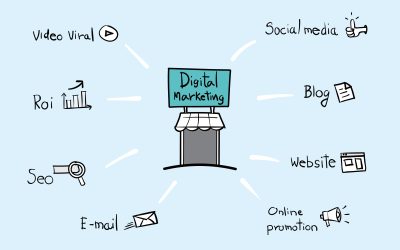Digital marketing is essential for the success of small businesses. With an increasing number of consumers turning to the internet for information and purchases, businesses must develop a comprehensive digital marketing strategy to stand out. From social media to SEO, email marketing to paid advertising, each component plays a vital role in building a solid online presence. This blog will walk through the key steps small businesses can take to create an effective digital marketing strategy that drives growth and enhances visibility.
Understanding Digital Marketing for Small Businesses
Digital marketing is a broad term that encompasses all marketing efforts that use an electronic device or the internet. Small businesses must focus on leveraging these online channels to reach their target audience effectively. A well-rounded digital marketing strategy helps businesses increase brand awareness, attract qualified leads, and ultimately convert those leads into loyal customers.
For small businesses, the challenge lies in understanding which tools and strategies will yield the best results given their specific goals and budget. Therefore, a tailored and strategic approach is crucial.
Key Elements of an Effective Digital Marketing Strategy
To craft a digital marketing strategy that works, small businesses need to focus on several core areas. Each element will contribute to building a strong and consistent online presence. Here’s a breakdown of key components that should be included:
1. Search Engine Optimization (SEO)
Search engine optimization (SEO) is one of the most powerful ways small businesses can boost their online presence. When a business’s website is optimized for search engines like Google, it becomes more likely to appear in relevant search results. This increases the chances of attracting organic traffic—people who are already searching for your services.
SEO can be broken down into two main categories:
- On-Page SEO: This involves optimizing elements on the website, such as content, meta tags, images, and headings, to ensure that search engines can easily index and understand the site.
- Off-Page SEO: This involves building backlinks and improving brand authority across the web. It helps search engines trust your business and increase visibility.
By focusing on SEO, small businesses can reach their audience when they are actively searching for products or services that the business offers. Local SEO is especially important for small businesses aiming to target nearby customers.
2. Content Marketing
Content marketing is a key component of any successful digital marketing strategy. It involves creating valuable content, such as blog posts, videos, and social media updates, that addresses your target audience’s needs and interests.
Effective content marketing establishes your business as an authority in your industry, builds trust with your audience, and encourages engagement. Regularly publishing helpful and insightful content can lead to higher traffic, improved SEO rankings, and more conversions.
For small businesses, content marketing can be an affordable way to educate customers, tell your brand’s story, and create long-term relationships with your audience. Whether it’s through blogs, podcasts, or social media posts, content is a crucial tool in building brand recognition.
3. Social Media Marketing
Social media platforms, such as Facebook, Instagram, and LinkedIn, offer unique opportunities for small businesses to engage with their audience. These platforms allow businesses to reach a wide audience, promote products or services, and foster a community around their brand.
Small businesses should develop a social media strategy that aligns with their goals. The key is to be consistent with posts, interact with followers, and share content that resonates with the target audience. Paid social media campaigns can also be used to target specific demographics and increase the reach of marketing efforts.
Since social media is an essential aspect of online marketing, leveraging these platforms allows businesses to directly communicate with potential and existing customers in a more personal and authentic way.
4. Email Marketing
Email marketing is one of the most cost-effective ways to keep in touch with customers. By collecting email addresses through website forms, e-commerce transactions, or sign-up incentives, businesses can nurture leads and maintain a relationship with existing customers.
A strong email marketing strategy includes creating segmented email lists, sending personalized content, and using automated campaigns to keep customers engaged. Whether it’s through newsletters, promotions, or event announcements, email marketing can be highly effective for driving repeat business and boosting sales.
5. Paid Advertising (PPC)
Pay-per-click (PPC) advertising is a great way for small businesses to get immediate results. PPC ads allow businesses to appear at the top of search results for specific keywords. The business only pays when someone clicks on their ad, making it an affordable way to drive targeted traffic.
Google Ads and Facebook Ads are popular platforms for running PPC campaigns. Small businesses can use these platforms to drive traffic to their websites, generate leads, and increase sales. The key to successful PPC advertising is choosing the right keywords, creating compelling ad copy, and optimizing the campaigns for the best return on investment.
6. Website Optimization and User Experience
A well-designed and user-friendly website is the foundation of any successful digital marketing strategy. Your website should be mobile-friendly, easy to navigate, and fast-loading to ensure that visitors have a positive experience.
For small businesses, optimizing the website for both user experience (UX) and SEO is essential. Ensuring that the site is optimized for search engines and user-friendly will help increase conversions and improve search engine rankings.
The Role of a Small Business Marketing Agency
As a small business, you may not have the in-house resources to execute a comprehensive digital marketing strategy. This is where partnering with a small business marketing agency can make a significant difference. A credible and reliable marketing agency can assist in developing a customized digital marketing plan tailored to your business needs.
These agencies bring expertise in various areas, such as SEO, social media marketing, content creation, and PPC, to help small businesses achieve their marketing goals efficiently and effectively. If you’re looking to scale your online presence, a marketing agency can help you execute a strategy that drives real results.
To learn more about how a credible and reliable marketing agency can help your business grow, visit No Boundaries Marketing Group.
Conclusion
Creating an effective digital marketing strategy for small businesses requires careful planning and execution across multiple channels. From SEO to social media, content marketing to email campaigns, each component plays a vital role in boosting online visibility and driving growth. By focusing on a well-rounded approach and leveraging the right resources, small businesses can successfully compete in the digital world and achieve long-term success.


